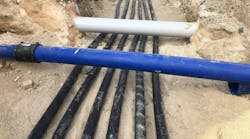The U.S. Department of Energy (DOE) and Israel's Ministry of Energy (MoE) along with the Israel Innovation Authority have selected eight clean energy projects to receive US$7.15 million under the Binational Industrial Research and Development (BIRD) Energy program. The total value of the projects is US$17.4 million, which includes US$10.25 million in cost share from the companies selected for funding.
BIRD Energy began in 2009 as a result of the Energy Independence and Security Act of 2007. Since then, including the projects announced recently, BIRD Energy has funded 55 projects with a total government investment of approximately US$42 million in addition to approximately US$55 million in funds matched by the private sector.
Each project is conducted by a U.S. and an Israeli partner. Selected projects address energy challenges and opportunities that are of interest to both countries and focus on commercializing clean energy technologies that improve economic competitiveness, create jobs, and support innovative technologies and companies.
U.S. Secretary of Energy, Dan Brouillette, said: "The BIRD Energy program fosters collaboration between U.S. and Israeli companies that has produced real innovations in renewable energy and energy efficiency. This partnership continues to build bilateral relationships that will benefit our economies and environment for years to come."
Dr. Eitan Yudilevich, executive director of the BIRD Foundation, said: "The BIRD Energy program is a magnet that attracts companies interested in joint U.S.-Israel innovation with each company playing a synergistic role aimed at achieving and commercializing technological breakthroughs. Despite the significant hurdles posed by COVID-19, companies succeeded in submitting high quality collaborative proposals."
The eight approved projects are:
- Addionics IL Ltd. (Tel Aviv, Israel) and Saint-Gobain Ceramics & Plastics, Inc. (Northboro, MA) will develop high-power, high-capacity solid-state batteries with novel electrode components.
- ECOncrete Tech Ltd. (Tel Aviv, Israel) and LafargeHolcim (U.S.) Inc. (Chicago, Illinois) will develop an eco-engineered concrete product for structurally sound scour protection and ecological uplift of offshore wind energy infrastructure.
- Eviation Tech Ltd. (Kadima, Israel) and AVL Powertrain Engineering, Inc. (Plymouth, Michigan) will develop electric aircraft battery.
- POCellTech Ltd. (Caesarea, Israel)) and W7energy LLC (Wilmington, Delaware) will develop a low-cost fuel cell system based on hydroxide exchange membranes.
- StoreDot Ltd. (Herzliya, Israel) and Nanoramic Laboratories (Boston, Massachusetts) will develop an ultra-fast charging power bank for mobile devices.
- Tadiran Batteries Ltd. (Kiryat Ekron, Israel) and Hit Nano Inc. (Bordentown, New Jersey) will develop silicon anode, nickel rich cathode, high-energy high-safety AA Li-Ion Cell for industrial internet of things applications.
- TurboGen (Ramat Gan, Israel) and En-Power Group (White Plains, New York State) will develop next-generation heat and power solutions.
- VisIC Technologies Ltd. (Nes Ziona, Israel) and Vepco Technologies (Chino, California) will develop an 80-kW Gallium Nitride (GaN)-based dual motor drive power inverter for both plug-in and battery electric vehicles.
Projects that qualify for BIRD Energy funding must include one U.S. and one Israeli company, or a company from one of the countries paired with a university or research institution from the other. The partners must present a project that involves innovation in the area of energy and is of mutual interest to both countries.
BIRD Energy has a rigorous review process and selects the most technologically meritorious projects along with those that are most likely to commercialize and bring about significant impact. Qualified projects must contribute at least 50% to project costs and commit to repayments if the project leads to commercial success.


